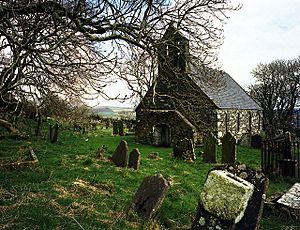Thomas Christian facts for kids
Thomas Christian (1754–1828) was an important figure on the Isle of Man. He was a church leader, a writer, and famously translated a long poem called Paradise Lost into the Manx language. He also wrote many Manx carols, which are traditional songs.
Contents
Life of Thomas Christian
Thomas Christian was born in 1754. His father, John Christian, was also a church leader (called a Vicar) in a place called Marown for 26 years. John Christian was known for translating parts of the Bible into the Manx language. Thomas followed in his father's footsteps.
In 1768 or 1769, Thomas became the Vicar of Peel. He wasn't very happy with this job at first, thinking it wasn't important enough. However, the local Bishop, Mark Hildesley, explained that his church roles actually paid him quite well.
After his father passed away in 1779, Thomas Christian became the Vicar of Marown in 1780. This meant he was following a family tradition, as both his father and grandfather had been the Vicar of that same parish before him. He continued in this role for many years. Thomas Christian lived to be 74 years old and passed away on September 14, 1828.
Manx Literature Contributions
Thomas Christian made big contributions to the literature of the Isle of Man, especially by translating a famous poem and writing carols.
Pargys Caillit - A Manx Masterpiece
One of Thomas Christian's most famous works is his translation of John Milton's epic poem, Paradise Lost. He called his Manx version Pargys Caillit, and it was published in 1796. This book was very important because it was one of the first non-religious books ever published in the Manx language. Before this, most books in Manx were Bibles or other religious texts.
At that time, many people on the Isle of Man spoke Manx, and for some, it was their main language. This helped Pargys Caillit become very popular. People loved it so much that stories tell of a woman in the 1850s who could recite the entire poem from memory, even though she couldn't read!
The first edition of the book wasn't printed very well, but the poem itself was so good that a new, better version was soon made. Christian's Pargys Caillit wasn't just a direct translation. He made some big changes, cutting down the original poem from over 10,500 lines to just over 4,000. He also added his own parts, like an introduction directly speaking to the Manx people.
Here's an example of his original introduction, in Manx and English:
|
A small bright ray beams shining on my heart
|
He also changed some parts of the story, like making the expulsion from heaven much shorter than in Milton's original. But he also added new details, especially about the creation of the world, which he expanded with over 350 lines.
Manx Carvals - Traditional Songs
Thomas Christian is also believed to have written several Manx carvals. These are long, rhyming carols traditionally sung on Christmas Eve. Two of his carvals are still known today.
One carol, 'Cre haghyrt mee roish yn ullick shoh chaih', was collected in a book of Manx carols in 1891. Another, 'Roish my row yn seihll shoh crooit' (meaning 'Before this world was created'), was published around 1790 and is considered one of the best Manx carvals ever written. This carol is like a shorter version of Paradise Lost and even includes lines that later appeared in Pargys Caillit.
Here's a small part of 'Roish My Row Flaunys Er Ny Chroo' (Before The Heavens Were Created):
| Roish My Row Flaunys Er Ny Chroo / Before The Heavens Were Created (extract) | |
|---|---|
|
Before heaven was created
|
Thomas Christian's work helped keep the Manx language and its unique culture alive through his writings and translations.
 | Dorothy Vaughan |
 | Charles Henry Turner |
 | Hildrus Poindexter |
 | Henry Cecil McBay |


